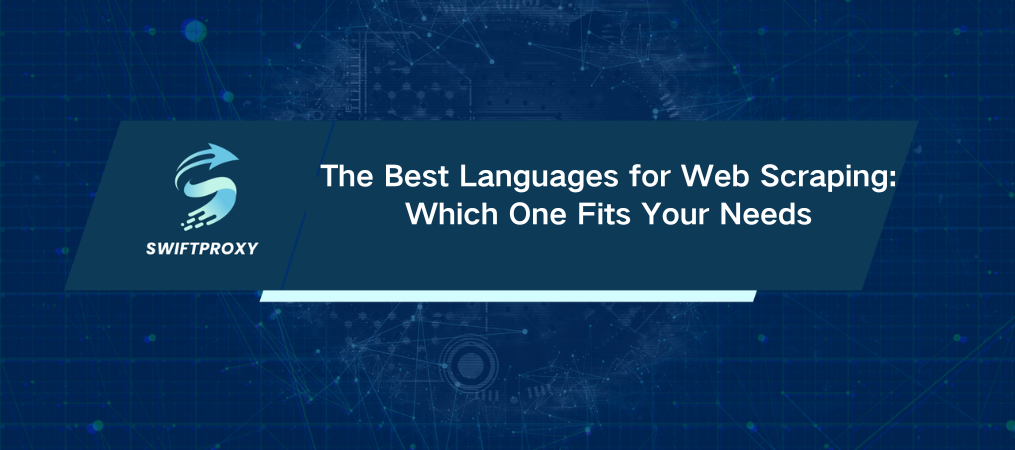The Best Languages for Web Scraping: Which One Fits Your Needs

Web scraping isn't just a buzzword – it's a crucial tool for gathering and analyzing data in industries ranging from e-commerce to finance. But success isn’t just about scraping; it's about how you scrape. The programming language you choose can make or break your project. So, what's the best language to use?
When evaluating languages for web scraping, it's important to weigh factors like speed, ease of debugging, community support, and performance. Whether you're looking to scrape small datasets or handle large-scale operations, your language choice should fit the task.
This guide will break down the top programming languages for web scraping and help you choose the best one for your needs.
Best Languages for Web Scraping
Web scraping is used everywhere—from tech startups to established enterprises. But when it comes to actual implementation, only a handful of languages rise to the top. Let's dive into why Python, Node.js, Ruby, PHP, and C++ are the go-to options for most developers.
Python
Why Python is a Go-To for Web Scraping
· Open-source and free
· User-friendly and easy to debug
· Massive library of modules
· Versatile: works with multiple programming paradigms
Python is often the first language that comes to mind for web scraping—and for good reason. It's simple, powerful, and easy to get started with, even if you're new to programming. Python's extensive library support (think BeautifulSoup, Scrapy, and Selenium) makes it incredibly efficient for extracting data from websites. Its dynamic typing and ability to handle multiple programming styles give it unmatched flexibility. Plus, Python's syntax is so clean, you can often achieve the same results in fewer lines of code compared to other languages. That makes it ideal for fast development and debugging.
If you're looking to scrape data quickly and efficiently, Python is the language to beat.
Node.js
Why Choose Node.js?
· JavaScript-based
· Real-time data handling
· Great for handling multiple requests
· Perfect for API-driven scraping
Node.js might not be the first name that comes to mind when you think of web scraping—but it's a powerful tool for specific needs. Originally designed as a JavaScript runtime for the server side, Node.js shines in real-time data processing and handling multiple requests simultaneously. It's ideal for smaller to medium-sized scraping tasks that don't involve massive data extraction.
It's not without limitations, though. Node.js is best for relatively simple scraping projects. For more complex operations, it might struggle to keep up with the scale.
Ruby
Why Ruby Might Be Your Secret Weapon
· Intuitive syntax
· Excellent for prototyping
· Nokogiri and Mechanize libraries
· Active and supportive community
Ruby is another dynamic, open-source language that’s widely used for web scraping. Its object-oriented nature makes it great for building reusable scraping tools. The syntax is straightforward, so you can quickly get to the task at hand without getting bogged down by complexity. Plus, Ruby’s active developer community offers a wealth of libraries (like Nokogiri) that simplify the scraping process.
Ruby is great for prototyping or when you need to spin up a scraper fast. The only downside? It can be a bit slower than Python or Node.js for larger tasks.
PHP
When to Use PHP for Scraping
· Platform-independent
· Rich libraries for media scraping
· Great for real-time data
· Supports cURL for easy scraping
PHP is a server-side scripting language that powers much of the web. Though it's not commonly seen as a top choice for scraping, PHP can still handle simpler tasks like scraping images or videos. It's highly effective for tasks that involve content management systems, and its cURL library is a useful tool for extracting media from websites.
But PHP isn't the best for large-scale scraping. It lacks multi-threading support, which can cause performance issues for complex projects. Still, for lightweight scraping tasks, PHP has its place.
C++
C++: When You Need Power and Precision
· High-speed processing
· Support for parallel processing
· Advanced memory management
· Ideal for specialized tasks
C++ isn't the first language most developers think of when it comes to web scraping. But for highly specialized tasks that demand extreme speed or memory efficiency, C++ can deliver. It offers powerful tools for custom HTML parsing and supports parallel processing, meaning you can run multiple scrapers at once.
However, C++ is more complex than languages like Python or Ruby, and it requires a deeper understanding of programming. It's also not the most efficient choice for typical web scraping tasks unless you're dealing with heavy lifting and large datasets.
Which Language Should You Choose
Choosing the right programming language isn't just about popularity—it's about fit. For straightforward, scalable scraping projects, Python and Node.js are often the best choices. If you're prototyping or need something lightweight, Ruby is worth considering. PHP works well for scraping media, while C++ is your go-to for high-performance, specialized tasks.
The key is knowing what your project requires. Every language here can make HTTP requests and parse HTML, but the one you choose should align with your needs—whether that's speed, scalability, or simplicity. Assess your project goals before diving in.
The Importance of Proxies in Web Scraping
Web scraping often encounters roadblocks like IP bans or rate limiting. This is where proxies come in. Using proxies helps bypass security measures, maintaining anonymity and allowing you to scrape data from a variety of sources without getting blocked.
Proxies are essential for geolocation targeting, enabling you to use IPs from different countries for more accurate data collection. They also help bypass bans by rotating your IP, keeping your scraper under the radar, and provide access to global data, allowing you to collect information from any location worldwide.
The Bottom Line
Web scraping doesn't have to be complicated—but it does require the right tools. Choose wisely, and your scraping tasks will be faster, more efficient, and ultimately more successful.

















































